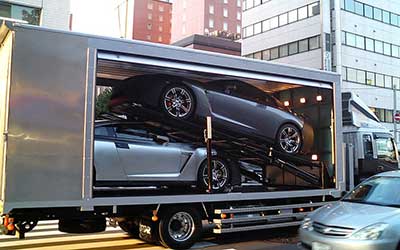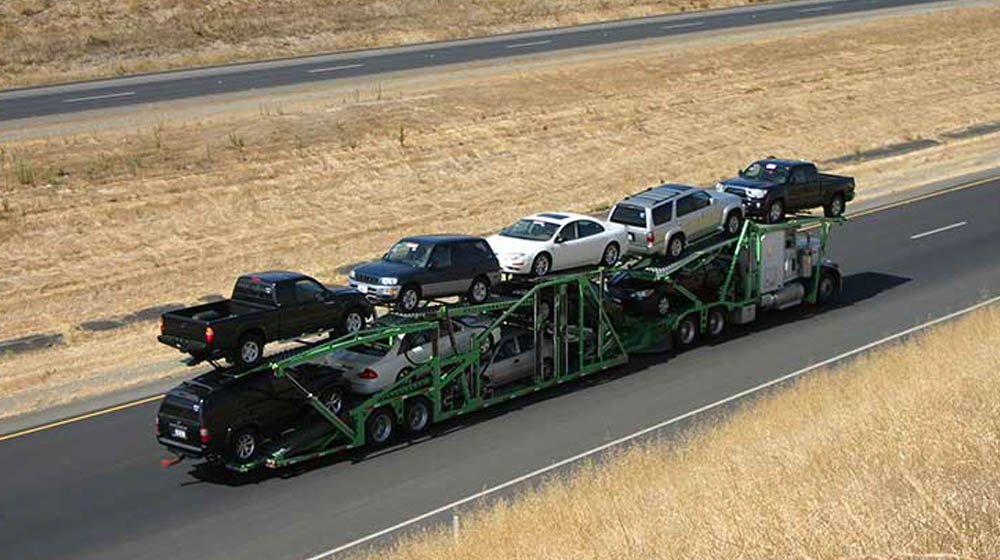When you move to another state or buy a car online, you might consider shipping your vehicle with a car shipping company rather than driving it yourself. Your options for the transort is either open or enclosed shipping methods. Below we provide information to help you decide which car shipping method is best for your budget and vehicle.
The Differences Between Open and Enclosed Car Shipping
Both open and enclosed car shipping methods transport your vehicle by truck.
Open transport usually ships your car on a long, two-level trailer. (You’ve probably seen these trailers loaded with vehicles on the highway.) This method is suitable for any type of vehicle and is the best choice if you want to ship a standard model or a used car.
Enclosed transport ships your vehicle in a fully enclosed trailer. This offers a higher degree of security and protection for your car. Enclosed transport is often the chosen shipping method for owners who wish to move a new car, an antique, a collectible, or an expensive vehicle.
Pros and Cons of Open Car Shipping
Pros: Shipping by open transport is faster and cheaper than enclosed transport. In addition, it’s more common, making booking a preferred shipping and arrival time easier.
One truck can move up to 10 vehicles at a time. Plus, an open-air trailer is lighter than an enclosed trailer, resulting in cheaper fuel costs.
Cons: The open transport trailer is open-air, which exposes your vehicle to weather and road debris during transport. Prepare to give your car a good cleaning upon arrival if you choose open-air transport.
Important Tip: Request a “top load” for open carriers, which tells the company to load your car on the upper deck of the two-tier carrier. This protects your car from debris on the road and the cars that normally are above.
Pros and Cons of Enclosed Car Shipping
Pros: Your vehicle is shipped in an enclosed trailer, protecting it from weather and road debris. Enclosed carriers also offer a higher level of vehicle security and protection. Drivers of enclosed carriers are more experienced in the care of high-end vehicles.

Some companies offer a white glove transport option with enclosed shipping. White glove car service often includes better customer care, attention, and transparency throughout the process, like:
- Constant communication and updates
- Greater insurance protection
- Single-car trailer
Cons: Enclosed carriers can move fewer cars at once, which drives up the cost. There is also less opportunity for the driver to conduct routine inspections of your vehicle during transit. Enclosed carriers are heavier and less fuel-efficient, which causes higher fuel costs.
Types of Open-air Carriers Can to Choose From
The three main types of open car shipping carriers are:
- Two-level, multi-car carrier: The most popular choice.
- Single-level, multi-car carrier: Often used for moving sports and luxury autos and expedited deliveries.
- Dully truck with a single-level tow trailer: Best for short-distance or local deliveries.
Types of Enclosed Carriers to Choose From
Soft-sided and hard-sided trailers are available with enclosed car shipping. Enclosed trailer options include multi-car trailers, two-car trailers, and one-car trailers.
- Multi-car enclosed trailers can hold up to 10 cars. This is usually the most inexpensive choice if you are considering an enclosed trailer.
- Two- or one-car trailers are understandably more expensive options for high-dollar, antique, or rare vehicles and express deliveries.
What Affects the Cost of Shipping a Car?
The shipping method (open or enclosed) greatly affects your final price when shipping your car. Other factors include your vehicle’s make and model and the distance it must travel. Account for these factors when calculating a shipping price:
-
Distance: While it costs less per mile to travel further, long-distance trips can cost more overall. You’ll also need to consider fuel costs, which could impact the price at any distance.
-
Location (starting and arrival destinations): If you live in a rural area, shipping your car can be complicated or challenging for the company or driver. A few auto carriers are willing to travel to a remote area to pick up or deliver a single vehicle. This can mean longer wait times for pick-up and delivery, plus a higher cost.
-
Vehicle make and model: Smaller, lighter cars are easier and cheaper to ship than larger, heavier ones. Inoperable cars are also pricier. Carriers will weigh your car before shipping.
-
Shipment destination: Going terminal-to-terminal is usually cheaper than door-to-door shipping.
-
Type of transport: Open car shipping is generally less expensive than enclosed transport.
Choose a Registered Car Transport Service
Car shipping carriers and brokers conducting business across state lines must be registered with the Federal Motor Carrier Safety Administration (FMCSA). Reputable car shipping carriers and brokers should have a six-digit “MC Docket” number. Additionally, they should possess a seven-digit “USDOT” number. Ask your carrier or broker for these numbers and check their validity by performing a carrier search for the MC Docket number on the USDOT government website.


